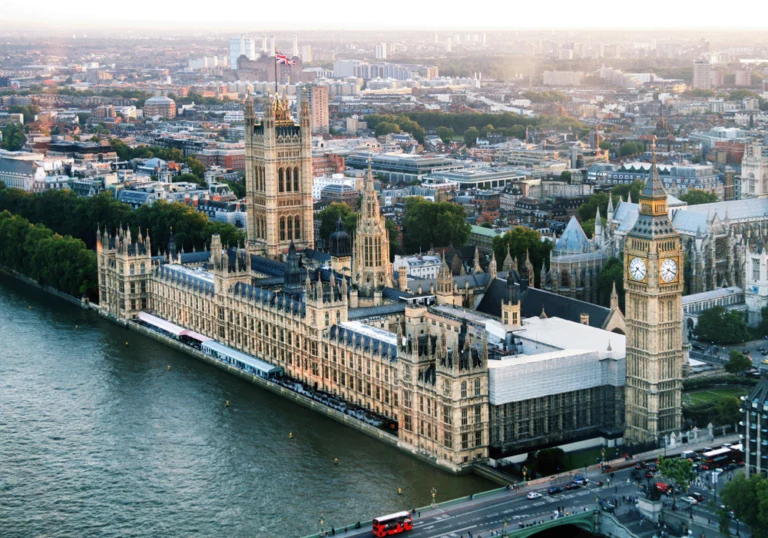
UK tax policymaking – is it fit for purpose?
This article was first published in Taxation magazine on 27 October, 2022
In 2005, the Inland Revenue and HM Customs & Excise merged to form HM Revenue & Customs (HMRC). As part of the merger, the policy functions of those former departments moved to HM Treasury (HMT). HMT became responsible for “strategy and tax policy development” with HMRC being responsible for “policy maintenance”. This re-allocation of responsibilities was combined with closer working between HMRC and HMT with both being co-located in the landmark Great George Street building (HMRC on the Whitehall side and HMT on the Horse Guards side).
This new structure was put in place by Gordon Brown and Gus O’Donnell (a very senior civil servant), and possibly it was a power grab by HMT and to enhance Gordon Brown’s powerbase. Even if it was, it seemed to work pretty well to begin with. Meeting invites would often allow you to use either entrance/exit, both HMRC and HMT staff attended meetings on equal terms, and it was all very joined up. Is it still working as well though?
During her leadership campaign, Liz Truss said that HMT needs to change. It wasn’t very clear what she had in mind, and it might just have been a dig at Rishi Sunak. Perhaps also there was an implication that the HMT empire has gotten too big, with one of the reasons being Brexit and another being Levelling Up. She also might not have had tax policy in mind, but her comment started me thinking. It is now clear that Liz Truss said many things that should be ignored but there is no doubt that her short premiership has proved that tax policymaking could be improved.
What is the policy partnership?
The HMRC page “About us” on .GOV.UK states that:
“The Treasury lead on strategic tax policy and policy development. HMRC leads on policy maintenance and implementation. This arrangement for policy making is known as the ‘policy partnership’”.
Given that it goes on to state that HMRC reports to Parliament through a Treasury minister, this clearly suggests to me that HMRC is subservient to HMT. Also, HMRC is not responsible for all taxes in the UK and it is not clear how Revenue Scotland and Revenue Wales fit in. Further, there are 333 local authorities in England, 22 in Wales, 32 in Scotland, and 11 in Northern Ireland – all are tax authorities (they assess and collect business rates and council tax).
Other bodies include the OTS, which is currently part of HMT, whereas The Office for Budget Responsibility (OBR) is independent of the UK government and has no specific tax responsibilities. There is also the Northern Ireland Fiscal Council to consider, especially in the light of the current consultation on devolution of taxation rights to Northern Ireland, but its initial terms of reference do not specifically mention tax.
Table 1 sets out the tax responsibilities and obligations of these government departments. HMT has many other responsibilities and obligations though. In particular:
- five responsibilities (of which one is the strategic oversight of the tax system);
- eight priorities (of which two are simplification and fairness, and increasing competitiveness of corporate taxes); and
- three objectives, none of which specifically mention tax.
This looks a pretty confused list of undertakings and can’t help effectiveness. Apart from strategic oversight of the tax system, HMT’s other responsibilities include achieving economic growth, controlling public spending, banking and financial services regulation, and both public and private sector infrastructure projects. It seems an awfully big ask. So, maybe HMT is too big and being expected to do too many things.
Table 1 – Departmental obligations for UK taxation
| Purpose & responsibilities | |
| H M Treasury | Strategic oversight of the UK tax system: including direct, indirect, business, property, personal tax, and corporation tax
Specific tax priorities: · Creating a simpler, fairer tax system · Making corporate taxes more competitive |
| Office for Tax Simplification (OTS) | Offer recommendations and advice to the Chancellor about how to make the UK tax system simpler, not least for individuals and smaller businesses |
| HMRC | Safeguarding the flow of money to the Exchequer through our collection, compliance and enforcement activities
Specifically: · Income Tax, Corporation Tax, Capital Gains Tax, Inheritance Tax, Insurance Premium Tax, Stamp, Land and Petroleum Revenue Taxes · Environmental taxes · Climate change and aggregates levy and landfill tax · Value Added Tax (VAT), including import VAT · Customs duty · Excise duties · Trade statistics · National Insurance · Tax credits · Child Benefit · Enforcement of the National Minimum Wage · Recovery of Student Loan repayments · Anti-money laundering supervision |
| Revenue Scotland | Collection and management of Scotland’s devolved taxes |
| Revenue Wales | · Design and deliver Welsh national revenue services
· Lead the better use of Welsh taxpayer data for Wales |
| Source: | Official websites “About us” |
Going beyond HMT though, and overall, there seems a lack of clarity, cohesion and logic about how all the various bodies fit together and pursue a common strategy. This is especially the case given that the OTS, Revenue Scotland and Revenue Wales have all come into existence since the HMT/HMRC policy partnership was put in place.
Nowhere is this lack of clarity and cohesion better summed up than in the current state of devolution and local government in the UK.
For business rates, it isn’t necessarily a new policy that is required as much as modern administration. Is it really sensible to have 398 taxing authorities involved in the collection and administration of two annual property taxes in the UK?
Devolving taxes within the UK
There is no separate tax authority in Northern Ireland but plans are being progressed for one to be put in place by the Northern Ireland Fiscal Commission. This issued its final report on 19 May 2022. It contained 23 recommendations of which the last one was:
“We recommend that the UK Government instigates a review to consider developing and implementing a shared institutional framework for fiscal devolution across the UK.”
A consultation on these recommendations opened on 4 October and closes on 29 November (Consultation on devolution of more fiscal powers | Department of Finance (finance-ni.gov.uk)).
This recommendation seems very sensible. Piecemeal changes are being introduced and in common with all the devolutionary changes, it is hard to see how it all fits together and who is setting the strategy. It is further confused by the lack of devolution for England or English regions. Are Revenue Scotland and Revenue Wales on a par with HMRC or subservient to it? Is England being favoured or ignored? If HMT remains responsible for tax strategy across the UK, and Scotland, Wales and Northern Ireland only get the right to administer their taxes, then is that devolution?
There are many unanswered questions around devolution in the UK, and not just about tax. A review seems a sensible action to take. This is turn is likely to influence the policy partnership between HMT and HMRC. Is it an equal partnership? How much dual handling of policy is there and is HMRC allowed to take the lead enough?
Local Government
I wrote an article for Taxation on local government finance for Taxation in 2004 called “The Never Ending Story” and we don’t seem to be any further forward than we were then. The can is constantly kicked down the road.
There remains a pressing need to reform business rates (and indeed probably council tax too) but where does responsibility for strategy on local government taxation sit? In scale, it probably needs HMRC, or a revenue body larger than local authorities to be involved, but HMRC, Revenue Scotland and Revenue Wales have no direct involvement. Primary responsibility for strategy presumably rests with HMT rather the Department for Levelling Up, Housing and Communities, however, that is a different body involved and doesn’t sit within the policy partnership.
For business rates, it isn’t necessarily a new policy that is required as much as modern administration. Is it really sensible to have 398 taxing authorities involved in the collection and administration of two annual property taxes in the UK?
What is the government’s tax strategy?
At the heart of all this is strategy, strategic thinking/planning and leadership. If there is a good clear strategy and an effective governance system, then everyone knows where they stand, what they are trying to achieve and how it all fits together. Given recent events, the UK government has not been providing much clarity and leadership of late.
Even if there was clarity of vision on the main strategy, the policy partnership relies upon there being a clear division between planning policy, and implementation and administration of the policy concerned. This division isn’t very obvious to me.
The economic structure of the UK tax system has materially not altered in 30 years (since council tax replaced the community charge and independent taxation was introduced). So, are more recent changes really strategic?
My assessment is that the Wilson government introduced the big 20th century strategic change with the introduction of corporation tax and capital gains tax (CGT) in 1965 and subsequently benefit in kind and other legislation was required to prevent avoidance through the use of companies. Payroll taxation followed in the late 60s, VAT replaced sales tax in 1973 and then the community charges/council tax changes in the 1980s and early 90s. Since then, most of the tax changes have been to tax rates, or to administration/tax law re-write. Are these post 1965 changes strategic? Possibly, depending on where you draw the line as to what is truly strategic, and what is only tactical.
A major reduction in a tax rate is probably strategic, such as reducing CGT from 40% to 10% in 1998 but a basic rate income tax reduction of 1% doesn’t sound strategic to me. A general anti-abuse rule (GAAR) might be strategic, but if so where does that leave targeted anti-avoidance rules (TAARs) which have proliferated across the tax system in the last decade and are at the heart of much of the complexity? Is Making Tax Digital (MTD) strategic? It is at the heart of administration so if it is within the ambit of HMT then that doesn’t leave much with HMRC. Perhaps that goes to the heart of the issue. If MTD is being driven forward by HMRC then do they have the ministerial clout required? If by HMT then do they have the detailed knowledge and understanding of the systems concerned?
Table 2 – Public sector receipts as a percentage of GDP
| 2021/22
% |
1999/00
% |
|
| Income tax | 9.6 | 9.2 |
| National Insurance Contributions | 6.7 | 5.4 |
| VAT | 6.0 | 5.4 |
| Corporation tax | 2.8 | 3.3 |
| Fuel duty | 1.1 | 2.1 |
| Tobacco & alcohol duties | 1.0 | 1.4 |
| Capital taxes | 1.7 | 1.0 |
| Council tax | 1.7 | 1.2 |
| Other taxes & receipts | 7.9 | 6.9 |
| 38.5 | 35.7 | |
| Source: Commons Library Briefing Paper 21 June 2022 |
To illustrate this further, Table 2 shows how tax receipts have changed over the last two decades. Other than an overall increase in the tax burden, which has been primarily in national insurance rates, the changes are pretty minor except that taxes on the sale of specific goods (fuel, tobacco and alcohol) have decreased and VAT has been increased to compensate. Potentially, the corporation tax reduction is more pronounced as the number of corporates has increased over the period. These are relatively small changes in the make-up of tax receipts as a proportion of GDP. What is a bigger change is the increase in the volume and complexity of the tax legislation. Political interference and gimmicks go hand in hand with that complexity.
There was an analysis by the Institute for Government report in July 2019 called “Taxing Times – The need to reform the UK tax system” taxing-times-final.pdf (instituteforgovernment.org.uk). This observed that:
“tax reform over the past decade has been a mixture of clear strategy in some areas, drift in others and stealth tax increases”
which probably summarises the position pretty well. The “clear strategy” reference was to “a clear ambition to broaden the base and lower the headline rate of corporation tax” by the Coalition and Conservative governments under George Osborne as Chancellor.
As far as stealth taxes are concerned, the personal allowance clawback, High Income Child Benefit Charge and the pension tax relief taper are all recent examples which have been highlighted as economic disincentives in the tax system that should be targeted for reform. Targeting such pinchpoints could be a strategy but any solutions to them are likely to have potentially significant knock-ons and require a very detailed knowledge of the tax system. It is hard to see that HMT is appropriately skilled on its own for such a strategy but that shouldn’t be a problem as long as HMRC has the right people and the two organisations are able to work together.
No split between HMT and HMRC is ever going to be perfect. What is necessary is that those dealing with tax policy have enough understanding of the detailed workings of the tax system to understand what impact any changes or simplifications will have.
Having the skills
One of the current concerns about the UK economy is whether it has been de-skilled over recent years as more experienced individuals have retired, especially since the pandemic. Is it likely that HMT/HMRC would have been unaffected by this trend – especially given the real terms pay reduction in the public sector? That seems unlikely to me.
Many tax practitioners will certainly think that HMRC has lost too many experienced and skilled individuals, especially given the wholesale reorganisation of the organisation to large regional hubs and the closure of traditional tax offices. The danger is that both HMRC and HMT have lost experienced individuals who have not been adequately replaced.
Another issue is the nature of rotations of staff within the civil service. By moving individuals between roles they strengthen their broader knowledge of government and tax but do they have the depth of knowledge required?
I wondered whether HMT had enough tax qualified individuals and made a Freedom of Information Act request on this point. As Table 3 shows, there are nearly 2,000 FTEs at HMT. Of that total, 52 have been sponsored to take a tax qualification, which is typically a single ATT, ADiT or CTA paper. A small number go on to take the full ATT or CTA qualification. Others may have the qualification but have not been sponsored by HMT. Even if there were more such tax qualified individuals at HMT, it is doubtful whether much of the ATT or CTA qualification would be relevant as much of the work being done at HMT would be outside the syllabuses of those qualifications.
There is dedicated tax training at HMT featuring a variety of courses including a Tax Policy Foundation Programme delivered by Manchester Metropolitan University. The need for training is clearly understood and I quote the following from the response I received from HMT:
“The Treasury is fully committed to ensuring that its staff have the right skills and experience. For tax, this means supporting staff to develop a depth of technical understanding, and an ability to combine this with strong policy skills. As such, the Treasury has offered sponsorship of professional training since 2017 for those working on tax issues.”
There is a danger that as someone who did economics at A level, accountancy at university, qualified as a chartered accountant, did ATII (now CTA) and then a CTA fellowship by thesis, that I think that those are the best qualifications to give you an understanding of the UK tax system. So, trying to put to one side my inherent bias, my principal concern is that if HMT is responsible for tax strategy that there should be a greater number of professionally qualified tax professionals within it – if for nothing else than to try and help diversity of thought outside of an HMRC and economist mindset. On this basis, I’m glad that sponsorship for professional qualifications has been offered by HMT since 2017.
Complexity and simplification
It is worth considering complexity and tax simplification further given Kwasi Kwarteng’s decision to abolish the OTS and to mandate HMT and HMRC to directly focus on simplifying the tax code.
Table 3 gives a breakdown of the HMT groups by full time equivalent (FTE) staff. As can be seen, there are about 292 FTEs in the two main tax groups. There are 7 in the OTS. Given this lack of scale, it is very hard to see how the OTS was ever going to have much impact on simplifying the UK tax code. It always seemed something of a fig leaf for tax simplification.
Table 3 – HM Treasury Groups
| FTE | |
| Business and International Tax | 149.3 |
| Corporate Centre | 233.9 |
| Economics | 94.0 |
| Enterprise & Growth | 227.5 |
| Financial Services | 175.2 |
| Financial Stability | 83.1 |
| Fiscal | 108.0 |
| International | 178.2 |
| Ministerial & Communications | 114.4 |
| Office of Financial Sanctions Implementation | 37.8 |
| Office of Tax Simplification (OTS) | 7.4 |
| Personal Tax, Welfare & Pensions | 142.8 |
| Public Services | 156.9 |
| Public Spending | 171.0 |
| Strategy, Planning & Budget | 87.2 |
| 1,966.7 | |
| Source: “The HM Treasury Outcome Delivery Plan 2021 to 2022” |
The ICAEW news item published on 26 September 2022 announcing the closure of the OTS, states:
“The OTS was founded in 2010, taking over from the former Tax Law Rewrite project, which started in 1995 following a previous attempt to simplify the tax system”.
I remember a retirement lunch for Adam Broke at Chartered Accountant’s Hall nearly 20 years’ ago, in which he stressed the need for those present to get behind the Tax Law Rewrite Project “as the only game in town” and that otherwise it would be closed down. Well that seems to be what has finally happened. The end of the OTS could be a helpful reduction in the list of bodies set out earlier in this article, if the government is true to its word and embeds tax simplification within policymaking and implementation – but it’s a big “if”.
The tax system is economically fairly similar to that of 30 years’ ago and yet during that time it has become hugely complex.
Role of Parliament
Tax legislation would be improved if it was subject to more scrutiny and review at the outset. Whilst HMT and HMRC could do more, it would be better for everyone if Parliament was more effective in its role of producing good tax legislation. Clearer strategy allows for more forward planning which in turn allows for better timetabling and efficient use of the time available to scrutinise and challenge draft legislation.
Finance Bill Committees have struggled to fulfil an effective role once the size of the Finance Bills expanded so dramatically in the 1990s and 2000s. How can the poor souls on the committee possibly scrutinise hundreds of pages of detailed tax legislation in the time available?
There must be scope to improve the process of drafting tax legislation and its scrutiny in order to help both simplify and improve the tax system. More Parliamentary time is probably part of the answer but other procedural changes might help.
It is left to the professional bodies, interested individuals and industry organisations to lobby members of the Finance Bill Committee – with limited notice of the tax legislation and consequently limited capacity to thoroughly review it.
Perhaps it be better if representations were made to the committee as a whole or Parliament, with obligations on those making submissions and put on public record? Perhaps the committee could also summon witnesses to give evidence – much like the Public Accounts Committee does or the Economic Affairs Committee of the House of Lords. So that expert input was sought as part of the process, in a way that is more similar to a court seeking expert input.
Alternatively, is there a way for more effective scrutiny of tax legislation through a reformed House of Lords? There is now a Finance Bill Committee in the House of Lords but under current rules it doesn’t have much clout.
Once again, the knowledge and understanding of the members of Parliament is relevant. Experience, legal training and tax knowledge all improve effectiveness, as does practical commercial understanding of the impact of the proposed measures. Should there be a training programme for the MPs concerned?
Conclusion
In conclusion, the current structure of all the bodies involved in the UK tax system, and their roles and responsibilities does appear to be in need of revision. The main weakness though is the lack of a clear over-arching strategy, and political leadership, to give commonality of purpose and direction. The tax system is economically fairly similar to that of 30 years’ ago and yet during that time it has become hugely complex. What then is the point of all the fiddling with taxes – especially by people who don’t seem to have much detailed understanding of the changes they are making?
Against this background, and tokenism on tax simplification, it is hard to see that the OTS was achieving much – but wishing for tax simplification won’t make it happen. As with the absence of a clear government strategy on tax, there needs to be a documented and rolled-out policy to mandate HMT and HMRC to simplify the tax code. Part of that has to be further upskilling of the individuals involved to have greater knowledge of the detail of the tax legislation and systems. Even then, there has to be a commitment from politicians to stop fiddling with tax rules – never again, should we have a policy to cut the basic rate of income tax by 1p whilst freezing allowances and thresholds.
Find out more about PKF Francis Clark’s team of tax specialists.
Written by












